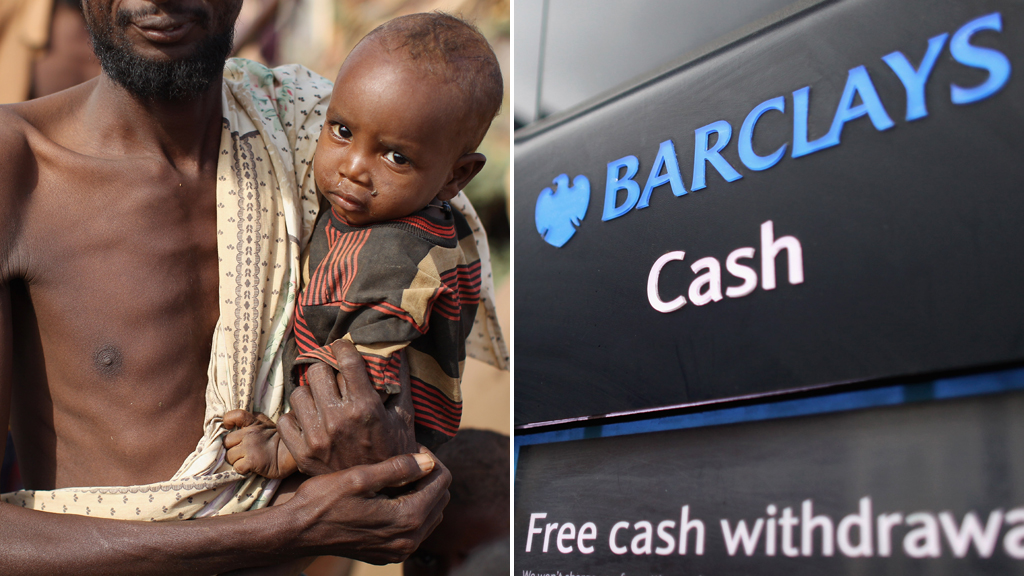Don’t close Somali cash ‘lifeline’, charities tell Barclays
 Jamal Osman
Africa Correspondent
Jamal Osman
Africa Correspondent
In the latest attempt to save Somalia’s cash “lifeline”, nine aid agencies call on Barclays Bank to scrap plans to sever money transfer accounts.

It is is the only bank in the UK still providing this service. However, it plans to close all the accounts of Somali money transfer firms by the end of this month.
There is a perceived legal and reputational risk of providing banking services to the sector. Barclays is concerned that criminals and terrorists could use the existing system.
The banking rules are illogical, cold hearted and counter-productive. Mark Goldring, Oxfam
However, millions of Somalis depend on money sent to them by relatives living abroad. Somalis in Britain, for example. send over £100m a year to friends and families. The country has no formal banking system and money transfer operators provide the services people in the UK would expect from a bank.
‘Cold-hearted’
The agencies, which include Oxfam, CARE and World Vision, said that Barclays needs to put on hold for a year its decision to close accounts.
This will give time for governments and banks to agree appropriate regulations to keep open a lifeline to ordinary families while addressing concerns relating to money laundering.
“The banking rules are illogical, cold hearted and counter-productive,” said Mark Goldring, chief executive of Oxfam.
Cutting this lifeline would be a disaster for millions. Mo Farah
“It leaves families already struggling to make ends meet to go without. Closing money transfer companies’ bank accounts is likely to drive the money transfer business underground making it even more difficult to regulate. It will also hit the Somali economy hard just when the country is trying to get back on its feet.”
Last month, campaigners delivered a petition signed by more than 20,000 people to 10 Downing Street.
Mo Farah, originally from Somalia, threw his weight behind the movement. The double Olympic champion spoke personally about the crucial role remittances have played for his family and his foundation.
“Cutting this lifeline would be a disaster for millions,” he said. “The small sums sent home by British Somalis each week enable family members to buy food, medicines and other life essentials.
“I have been sending money home for a number of years and the Mo Farah Foundation, along with some of the world’s biggest international charities and organisations, including the United Nations, rely on these businesses to channel funds and pay local staff.”
Stable Somalia
Somalia is one of the poorest countries in the world and slowly recovering from a famine that struck two years ago. Nearly half the population live on less than $1 a day and more than two million people have had to flee their homes due to fighting and food shortages.
The government’s position flies in the face of the UK’s policy on Somalia. Mark Goldring
Families depend on the money for basic costs such as food, schooling and healthcare. It is believed that 40 per cent of families in parts of the country receive some form of remittance and that the money is integral to their survival.
The agencies also called on the UK government to work with the banks and money transfer agencies to find a long-term comprehensive solution. Failing to do so undermines the government’s commitment to help efforts to build a stable Somalia.
“The government’s position flies in the face of the UK’s policy on Somalia,” said Mr Goldring. “Britain has shown a genuine commitment to help Somalia rebuild itself and move beyond its ‘failed state’ label, but is not doing enough to address this failed state of anti-terror banking rules.
“Somalia will find it hard to work its way out of poverty and instability while its people are needlessly denied the financial support from their loved ones abroad.”
Barclays response
Barclays issued a statement in response to the above article. The statement reads –
“The ODI, who conducted research on this subject for Oxfam, have correctly pointed out that ‘this is not a crisis of Barclays making’. It is rather the result of regulatory pressure.
“We have been engaging with the UK Government, remittance industry bodies and other stakeholders to discuss the issues around providing banking services to the remittance industry, especially given the regulatory and financial crime pressures upon banks.”